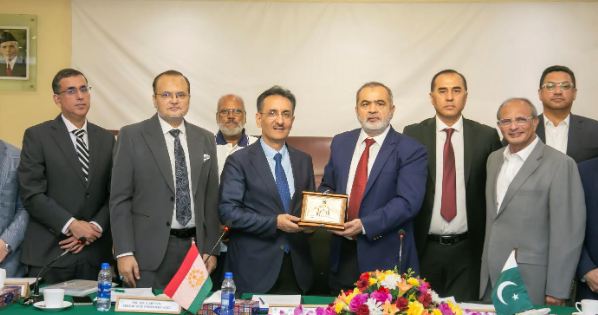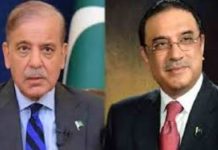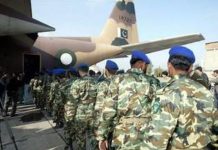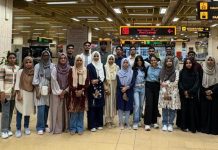DNA
KARACHI: Ambassador of Tajikistan Sharifzoda Yusuf, while highlighting the glorious history of Karachi which was a completely peaceful and secure city for foreign tourists in the 80s and 90s, stressed the need to fully restore the former glory of Karachi to attract the same number of tourists and even more not only from Tajikistan but also from Uzbekistan, Azerbaijan, Georgia, and Russia.
Exchanging views at a meeting during his visit to the Karachi Chamber of Commerce and Industry (KCCI), the Envoy added that the influx of tourists from Tajikistan, along with other countries in the region was a significant source of revenue in the 90s with Tajik tourists spending an estimated US$10 to US$15 million in Karachi.
Honorary Consul General Tajikistan Irshad Kassam, President KCCI Muhammad Jawed Bilwani, Senior Vice President Zia ul Arfeen, Vice President Faisal Khalil Ahmed, Chairman Diplomatic Missions & Embassies Liaison Subcommittee Ahsan Arshad Sheikh, Former President KCCI Majyd Aziz and KCCI Managing Committee Members attended the meeting.
While highlighting his experience in Karachi in 1992, when he attended a course at the Institute of Business Administration (IBA), the Ambassador reminisced about a time when Karachi was thriving — a bustling metropolis where commercial activity in Saddar continued until the early morning hours and the entire city had no security issues at all. “At that point in time, Karachi had become a magnet for tourists from Central Asia, including Tajikistan, Uzbekistan, Azerbaijan, Georgia, and Russia. In the 90s, direct flights from these countries to Karachi were frequent, bringing visitors who spent millions on Karachi’s high-quality textiles, leather goods, and other products”, he added.
He stated that the relations between Tajikistan and Pakistan have always been marked by historical brotherhood and the deep cultural and historical connections between the two nations are reflected in shared sites of significance, including the mausoleums of Sufi saints in Karachi and the Makli Graveyard in Badin, where many Tajik ancestors were laid to rest.
He was of the view that Pakistan has much to offer Tajikistan and its neighbours, including world-class textiles, seafood, and other high-quality products. “Until 2003, 85 percent of Tajiks wore Pakistani-made clothing and shoes”, he said while stressing the need to restore this trade.
He particularly underscored Pakistan’s competitive edge in seafood, including lobsters, king prawns, and tiger prawns, which could be exported to Tajikistan, Uzbekistan, and Kazakhstan. The Ambassador encouraged investors to explore these markets, which are highly receptive to quality Pakistani products.
“Tajikistan offers significant opportunities for investment, particularly in the textile industry. The country has abundant cotton yarn and a steady supply of electricity at just 2 cents per kilowatt-hour — one of the most affordable rates in the region”, Tajik Envoy said while inviting the business community to consider setting up textile manufacturing units in Tajikistan where foreign investors can own 100% of their businesses without the need for a local partner.
“Additionally, Tajikistan’s position as one of the top three most peaceful countries globally, with excellent law enforcement practices, makes it an attractive investment destination. The country is just a 52-minute flight from Islamabad, making it easily accessible for Pakistani investors”, he added.
He further hinted that direct flights between Karachi and Tajikistan were set to be launched soon whereas a Joint Ministerial Committee meeting between the two countries was scheduled for November 28th in Islamabad. Key discussions will focus on looking into the possibility of completing the CASA-1000 project by 2025 which would bring electricity from Tajikistan to Pakistan.
“The pharmaceutical sector in Tajikistan also presents significant potential for Pakistani companies. With 85% of the medicines used in Tajikistan being imported, the market for locally produced pharmaceuticals is vast”, said Sharifzoda Yusuf, “Tajikistan’s 11 million-strong population provides a large customer base, and pharmaceutical companies setting up manufacturing units in the country can enjoy full VAT exemption. Additionally, there are no tax or customs duties on industrial machinery for such ventures.”
Earlier, President KCCI Jawed Bilwani, while welcoming the Tajik Ambassador, stated that despite their friendly relationship, the trade volume between the two countries was below potential, and Pakistan hardly exported goods worth $14.66 million to Tajikistan in FY24. Hence, both countries need to work together with a strong emphasis on diversifying trade to enhance bilateral exports and promote economic cooperation.
He believed that Tajikistan, one of Central Asia’s largest cotton producers with key regions in Khatlon and Sughd, could attract Pakistani investors by offering incentives for setting up textile mills. Exempting textile machinery imports and providing tax relaxations would boost textile integration and promote large-scale manufacturing between the two countries in the textile sector.
He further noted that the Central Asia-South Asia Electricity Transmission & Trade Project (CASA-1000) is a major energy project that will transport 1,300 MW of surplus electricity from Central Asia to South Asia, including Pakistan, enhancing cooperation and connectivity between the countries. “Tajikistan uses a larger share of renewable energy sources than other countries in the Region, while Pakistan faces high energy tariffs which is restricting its GDP potential. Collaborating with Tajikistan and learning its expertise in renewable energy, could help Pakistan expand its hydropower sources, reduce its reliance on costly fuels, and ensure reliable energy for industries leading to sustainable economic growth”, he added.

















